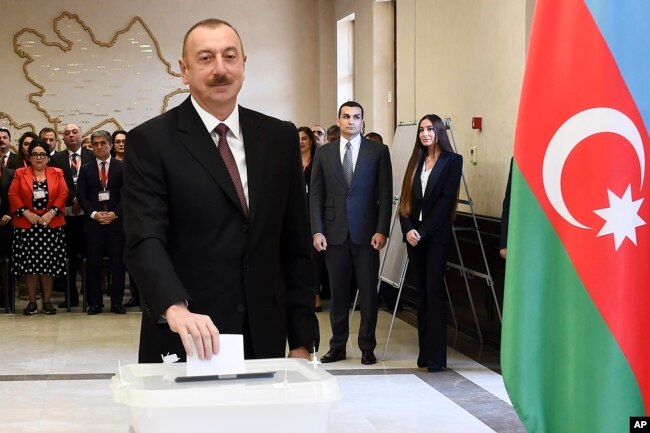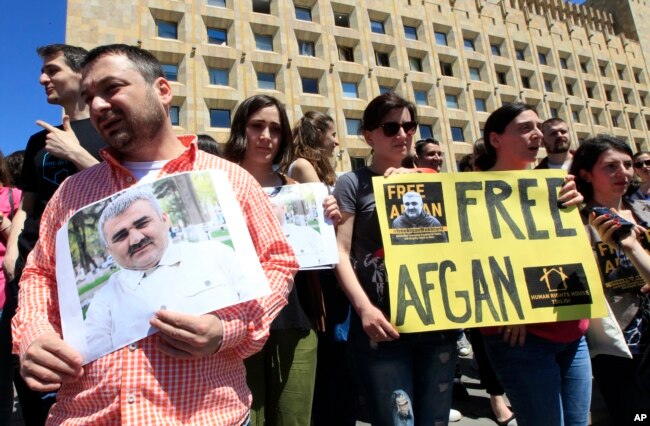Azerbaijan is a small country, yet it makes a large footprint on the world stage in two areas: oil, of which it has much, and media freedom, of which it has little, VOA news reports.
Azerbaijan’s oil wealth gives the nation’s president, Ilham Aliyev, an unusual amount of power on the world stage. World leaders such as Germany and the United States have protested the state of media freedom in Azerbaijan, but they also strive to keep good relations with the Caucasus nation on the shore of the Caspian Sea. Germany, in particular, has been discussing importing oil from Azerbaijan in an effort to reduce its dependence on Russian resources.
Khadija Ismayilova can tell you about media freedom in Azerbaijan from firsthand experience.
The 42-year-old journalist rose to international fame when she was jailed in 2015 for tax evasion and abuse of power. Since being freed after the Supreme Court amended her sentence, she remains on probation, which means she can’t leave the country.
That has prevented her from accepting a job in Lithuania and an award in Sweden, and visiting her mother before she died in a hospital in Ankara, Turkey. Her assets have been frozen by the government to pay the taxes it says she owes.
Ismayilova says she has been subjected to government harassment because of the subject matter she covers: Her corruption investigations have exposed far-reaching illegal financial dealings in the Aliyev family.
Yet Ismayilova continues to investigate corruption through an international organization known as the Organized Crime and Corruption Reporting Project. It is an investigative reporting platform that involves a number of nonprofit entities and major news organizations worldwide.
She also compiles records on political arrests and jailings in Azerbaijan — a practice that involves not just journalists but also political activists and human rights advocates. Lawyers, too, are in danger of retaliation from the government. Ismayilova says many lawyers have been disbarred because they defended people against the accusations of the government.
Convictions
Ismayilova has worked for Voice of America, and for Radio Free Europe/Radio Liberty, which closed its Baku bureau in 2014. That’s where the tax evasion charges began.
“Right now my legal problem is that the government announced I have to pay the tax on behalf of Radio Free Europe. It’s absurd,” she says. “Radio Free Europe is nonprofit and should not pay any taxes. But the government demands it.”
RFE has participated in her defense, but she says its response has been too slow and bureaucratic to do her any good. And tax evasion is not the only roadblock to her work.
“Another conviction that I have is illegal entrepreneurship. The government says that because I don’t have international accreditation in Azerbaijan’s foreign ministry, all the money I earn from foreign media is illegal.” She says she even has been fighting to obtain the honorarium from a UNESCO award she won in 2016.
Her work today involves teaching young journalists to do investigative work. But she does not teach in a traditional setting.
“I’m not allowed in classrooms,” she says, because universities must be licensed by the government. She works with nongovernmental organizations to find young journalists interested in investigative work, and then trains them in small groups in private settings.
Restrictive situation
Human Rights Watch says “the space for independent activism, critical journalism and opposition political activity in Azerbaijan has been virtually extinguished.” RSF ranks Azerbaijan 166th out of 183 countries in its 2019 World Press Freedom Index.
Today, she says, the country has more than a dozen journalists who are banned from leaving the country. There also are five journalists in prison.
When asked what would be a marker of change in her country of 10 million, Ismayilova’s answer is instant.
“Independent judiciary. When the judge will be able to say no to the political regime when he’s being ordered to rule against [a defendant] for political reasons. That will be a solution for many things.”
Still, Ismayilova says she wouldn’t want to move elsewhere.
“I don’t want to leave the country for good,” she says. “I love my country. But … when you know that you are trapped here, they make you feel that the country is not just motherland, it’s also a prison.”


